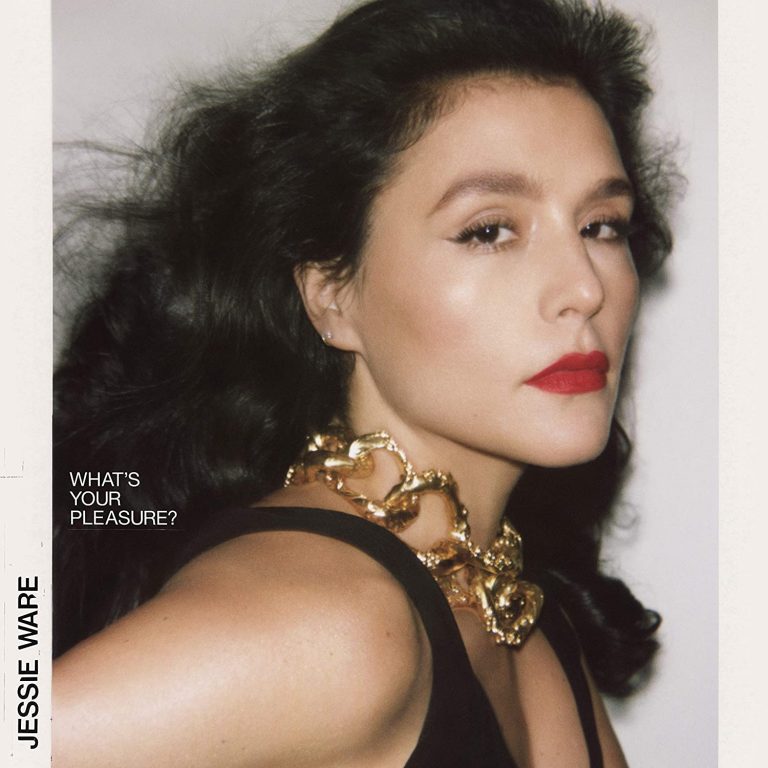Jessie Ware’s music career has had its share of ups and downs. Her debut album was a dance-pop wonder that catapulted her to the forefront of the scene, but its two successors were met with diminishing returns. That all culminated in an underwhelming tour that had Ware questioning her pursuit of music altogether. Thankfully, she decided not to give up and now moves forward by looking back to where she began: the dancefloor. Despite some inconsistencies in presentation, Ware’s fourth studio album What’s Your Pleasure? is an opulent examination of her love for dance music and its spirited history.
Ware’s third album, Glasshouse, largely dealt with finding true love and becoming a mother. While it was personal to Ware on a lyrical front, the music came off as detached, and though received well critically, its slower pace didn’t grab audiences as much as she hoped. On What’s Your Pleasure? the shift in energy is immediately apparent.
Album opener “Spotlight” sets the scene with a swelling orchestra section, before stepping down from the balcony onto the dance floor. As the track comes into focus, a sly disco groove creeps in, propped up by Ware’s trademark vocals and slithering bass synths. “I just wanna stay in the moonlight / This is our time in the spotlight,” she declares. It’s one of the best introductory tracks in recent memory and is a powerful statement from an artist who wants everyone to know she is doing things her way and doesn’t give a fuck what anyone else thinks.
This sense of freedom carries throughout the album and encourages the listener to share in the euphoria. Ware sounds like she is having fun with her music again, rather than appealing to streaming algorithms or worrying about how a Coachella crowd will react. Unfortunately, the results aren’t always sensational.
“Ooh La La”, for instance, harkens back to 80s disco with its propulsive bassline, but her lyrics and vocal delivery come across as rigid and predictable. “Driving ’round, take me out, listenin’ to the music / Put your lips, on my cheek, that would make me happy,” she coos, almost speaking the words rather than singing them. Each syllable emerges separated from the next, creating somewhat of a robotic cadence. Ware uses this style on a few songs across the album with varying degrees of success, but it’s the moments when she allows her voice to stretch and expand that yield the most powerful responses.
Mid-album highlights “Save A Kiss” and “Adore You” are prime examples of Ware living her dance diva fantasy while flexing her vocal chops. The former is a delightful piece of house-pop that would make Robyn proud, and the latter slows things down a bit to make space for one of Ware’s most intoxicating and sultry vocal performances on the entire album. The chorus on “Adore You” can be played on an endless loop and would never get tiresome.
“The Kill” is the most notable departure from anything else on What’s Your Pleasure? and is almost jarring upon first listen. The track’s late-night vibe is alluring with a distinct, grimy quality that is uncommon in Ware’s music, but her voice drops too low in the mix to the point where nothing in the song manages to stand out. “Remember Where You Are” succumbs to a similar issue, with Ware giving a fantastic performance that almost disappears in the mix amidst a cinematic instrumental and a whole chorus of backup singers. The song still manages to be a success thanks to its great performances and sheer potency, but you can’t help but wonder how incredible it could sound with a few slight changes to the overall mixing.
What’s Your Pleasure? is Ware’s welcome return to her roots. At her best, she executes the album’s electrifying, lavish take on dance-pop better than many of her modern peers, but she isn’t able to maintain uniform excellence across all 12 tracks. Still, Ware displays her affection for disco, funk, and dance music with the utmost reverence. Though the album title poses a question to the listener, it feels directed inward – as if Ware asked herself what she wanted out of her own music, and then delivered on it.

